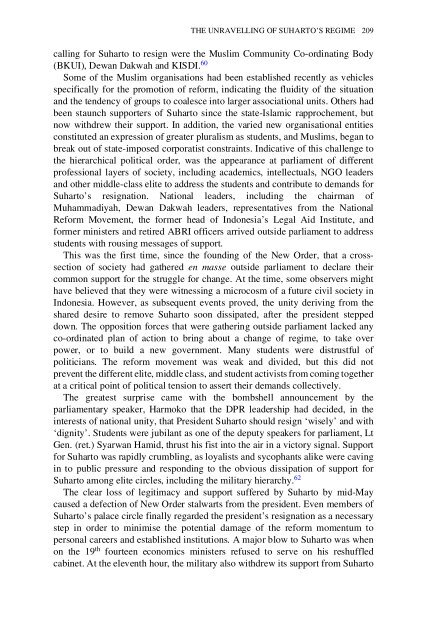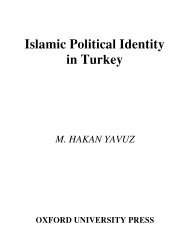You also want an ePaper? Increase the reach of your titles
YUMPU automatically turns print PDFs into web optimized ePapers that Google loves.
THE UNRAVELLING OF SUHARTO’S REGIME 209call<strong>in</strong>g for Suharto to resign were the Muslim Community Co-ord<strong>in</strong>at<strong>in</strong>g Body(BKUI), Dewan Dakwah <strong>and</strong> KISDI. 60Some of the Muslim organisations had been established recently as vehiclesspecifically for the promotion of reform, <strong>in</strong>dicat<strong>in</strong>g the fluidity of the situation<strong>and</strong> the tendency of groups to coalesce <strong>in</strong>to larger associational units. Others hadbeen staunch supporters of Suharto s<strong>in</strong>ce the state-<strong>Islam</strong>ic rapprochement, butnow withdrew their support. In addition, the varied new organisational entitiesconstituted an expression of greater pluralism as students, <strong>and</strong> Muslims, began tobreak out of state-imposed corporatist constra<strong>in</strong>ts. Indicative of this challenge tothe hierarchical political order, was the appearance at parliament of differentprofessional layers of society, <strong>in</strong>clud<strong>in</strong>g academics, <strong>in</strong>tellectuals, NGO leaders<strong>and</strong> other middle-class elite to address the students <strong>and</strong> contribute to dem<strong>and</strong>s forSuharto’s resignation. National leaders, <strong>in</strong>clud<strong>in</strong>g the chairman ofMuhammadiyah, Dewan Dakwah leaders, representatives from the NationalReform Movement, the former head of <strong>Indonesia</strong>’s Legal Aid Institute, <strong>and</strong>former m<strong>in</strong>isters <strong>and</strong> retired ABRI officers arrived outside parliament to addressstudents with rous<strong>in</strong>g messages of support.This was the first time, s<strong>in</strong>ce the found<strong>in</strong>g of the New Order, that a crosssectionof society had gathered en masse outside parliament to declare theircommon support for the struggle for change. At the time, some observers mighthave believed that they were witness<strong>in</strong>g a microcosm of a future civil society <strong>in</strong><strong>Indonesia</strong>. However, as subsequent events proved, the unity deriv<strong>in</strong>g from theshared desire to remove Suharto soon dissipated, after the president steppeddown. The opposition forces that were gather<strong>in</strong>g outside parliament lacked anyco-ord<strong>in</strong>ated plan of action to br<strong>in</strong>g about a change of regime, to take overpower, or to build a new government. Many students were distrustful ofpoliticians. The reform movement was weak <strong>and</strong> divided, but this did notprevent the different elite, middle class, <strong>and</strong> student activists from com<strong>in</strong>g togetherat a critical po<strong>in</strong>t of political tension to assert their dem<strong>and</strong>s collectively.The greatest surprise came with the bombshell announcement by theparliamentary speaker, Harmoko that the DPR leadership had decided, <strong>in</strong> the<strong>in</strong>terests of national unity, that President Suharto should resign ‘wisely’ <strong>and</strong> with‘dignity’. Students were jubilant as one of the deputy speakers for parliament, LtGen. (ret.) Syarwan Hamid, thrust his fist <strong>in</strong>to the air <strong>in</strong> a victory signal. Supportfor Suharto was rapidly crumbl<strong>in</strong>g, as loyalists <strong>and</strong> sycophants alike were cav<strong>in</strong>g<strong>in</strong> to public pressure <strong>and</strong> respond<strong>in</strong>g to the obvious dissipation of support forSuharto among elite circles, <strong>in</strong>clud<strong>in</strong>g the military hierarchy. 62The clear loss of legitimacy <strong>and</strong> support suffered by Suharto by mid-Maycaused a defection of New Order stalwarts from the president. Even members ofSuharto’s palace circle f<strong>in</strong>ally regarded the president’s resignation as a necessarystep <strong>in</strong> order to m<strong>in</strong>imise the potential damage of the reform momentum topersonal careers <strong>and</strong> established <strong>in</strong>stitutions. A major blow to Suharto was whenon the 19 th fourteen economics m<strong>in</strong>isters refused to serve on his reshuffledcab<strong>in</strong>et. At the eleventh hour, the military also withdrew its support from Suharto




